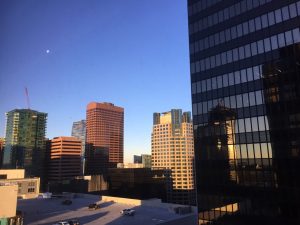I’m currently in Los Angeles for the American Physical Society March Meeting — the largest gathering of physicists in the world. This year there are almost 11,000 attendees, and more than 55 simultaneous sessions to choose from!
There are physicists everywhere — hordes descending on the convention center at 8 am Monday to pick up their badges and find the right room for one of those sessions to hear the talks they’ve picked out.
I had time for just a few interesting talks before I met up with Justine Walker ’18, who was giving an oral presentation on her Senior IS project, Dancing Our Way to Mars Through Physics.
Justine did a really good job with her presentation, and a lot of people were interested. There was a little gap with a missing speaker just before her talk, and she was the last speaker of the session, so everyone there was there specifically to hear her work. Lots of interest and lots of good questions, which she handled professionally. Anyone who has given a talk at the March Meeting knows that the questions can be the toughest part!

Mascot Leo is excited about the new APS coloring book for adults, with a packet of colored pencils to get started!
I spent the afternoon in a long series of invited talks focusing mainly on the advanced lab experiences for physics majors. I’ve been a member of ALPhA since it started about 10 years ago, and this was a session with other people who are interested in how our undergraduate physicists learn how to think about experimental work, analysis, uncertainty, etc.
Several of the speakers talked about how physics instruction needs to be a three-legged stool, where the three legs are the theoretical formalism, computation and modeling, and experiment and design. We tend to be very heavy on theory, with much less emphasis on experimental ways of thinking and learning. All three of these areas need to be valued. When we think about the undergraduate curriculum, we tend to think about topics (mechanics, E&M, thermal, etc) as opposed to methods (theory, modeling, experiment). There was a lot here for me to think about, especially some new ideas about what we should be doing in the introductory labs. Some studies have shown recently that using the labs to re-inforce concepts taught in intro physics does not actually work the way most professors assumed — the labs don’t help and they might even hurt! So, how can we get rid of the canned labs, and use the lab period to teach more about how to do experimental design and how to draw valid conclusions from the data? There are some exciting possibilities here.
Just outside this talk, I bumped into some people I hadn’t seen for a few years and a group of us went to dinner a block or so from the Convention Center, which it turns out is right next to the Staples Center. The restaurant was pretty packed until the Lakers game started partway through dinner.
Whew! And that’s just day one! Exciting talks tomorrow on Atomic Origami!







